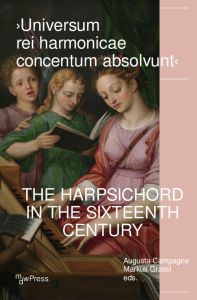Ever since its establishment in 2021, mdwPress—our university’s own open-access academic publisher—has been working to make research at the mdw both more visible and openly accessible. An advisory board comprised of outstanding researchers and scholars from within and outside the mdw both guarantees academic independence and assures publication quality. The following available and soon-to-be-released volumes can serve as a representative selection of the numerous publications that have already gone through the frequently elaborate mdwPress publishing process. These exemplify the diversity of the research being pursued at the mdw as well as the special desire that exists to support early-stage researchers, as evidenced by the forthcoming release of Lena Dražić’s dissertation. Furthermore, the journal Music & Minorities (M&M) will be joined this year by two new mdwPress periodicals: the International Journal of Music Mediation (IJMM) and the Bulletin of Empirical Music Education Research (b:em).

Silke Felber: Travelling Gestures – Elfriede Jelineks Theater der (Tragödien-)Durchquerung
It is with inimitable consistency that Elfriede Jelinek’s theatrical texts since Ein Sportstück (1998) have referred back to Greek tragedy. The author surveys the perspectives of Aischylos, Sophocles, and Euripides against the backdrop of right-wing populism, #MeToo, and the climate crisis—thus traversing and queering categorisations pertaining to gender, class, and ethnicity. In this volume, Silke Felber offers a first-ever description of Jelinek’s Theater der (Tragödien-)Durchquerung [Theatre of (Tragedy) Traversal] from a vantage point situated at the interface between theatre, literary, and cultural studies. Felber’s work, a foundational study rich in material, reveals gestures of lamentation and rage that point both back to antiquity and forward into an uncertain future.

Augusta Campagne, Markus Grassl (eds.): Universum rei harmonicae concentum absolvunt. The Harpsichord in the Sixteenth Century
This volume addresses various aspects of music for keyboard instruments in the 16th century. These include the aesthetic notions associated with playing on such instruments, the harpsichord’s geographic distribution during this period, the notation of keyboard music and its specific characteristics, questions of tempo, rhythm, and ornamentation, and iconography as a source for the reconstruction of playing techniques. The resulting thematic spectrum covers questions of repertoire and aspects of performance practice as well as plucked keyboard instruments’ 16th-century sociocultural significance.
Evelyn Annuß, Ralf von Appen, Sarah Chaker, Silke Felber, Andrea Glauser, Therese Kaufmann, Susanne Lettow (eds.): Populismus kritisieren. Kunst – Politik – Geschlecht
Right-wing populist parties and movements have been leaving their mark on politics for decades, now, and are hence nothing new. New indeed, however, are the increasing support and societal resonance that they have been enjoying since the turn of the millennium. In light of such political shifts, this volume devotes itself to the analysis of various primarily right-wing populist strategies and policies aimed at hollowing out institutions of parliamentary control and demolishing different types of representative democracy or at least transforming them so as to be compatible with authoritarian and radical forms of government that are nationalist as well as racist. The question as to strategies of aestheticisation that undermine political rules is key, here—as is the matter of how the cultural field and gender discourses serve as specific negotiatory terrains.
Lena Dražić: Die Politik des kritischen Komponierens. Diskursive Verflechtungen um Helmut Lachenmann
Contemporary music, so a frequently-heard narrative goes, confronts us with unaccustomed sounds and hence forces us to question how we relate to the world. It is said that contemporary music stirs us up and is hence always political. But is this really true? While the tendency toward “critical composing”, in particular, invokes values such as democracy, low thresholds, and the critique of domination, access to the contemporary music world hinges largely on privileges of education and of class. Employing the example of Helmut Lachenmann, one of the most prominent composers of the present day, Lena Dražić subjects texts about contemporary music to a discourse analysis that gets to the bottom of their political promises.

